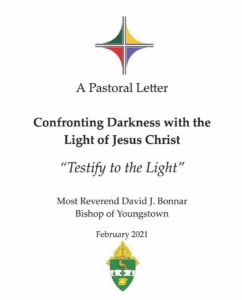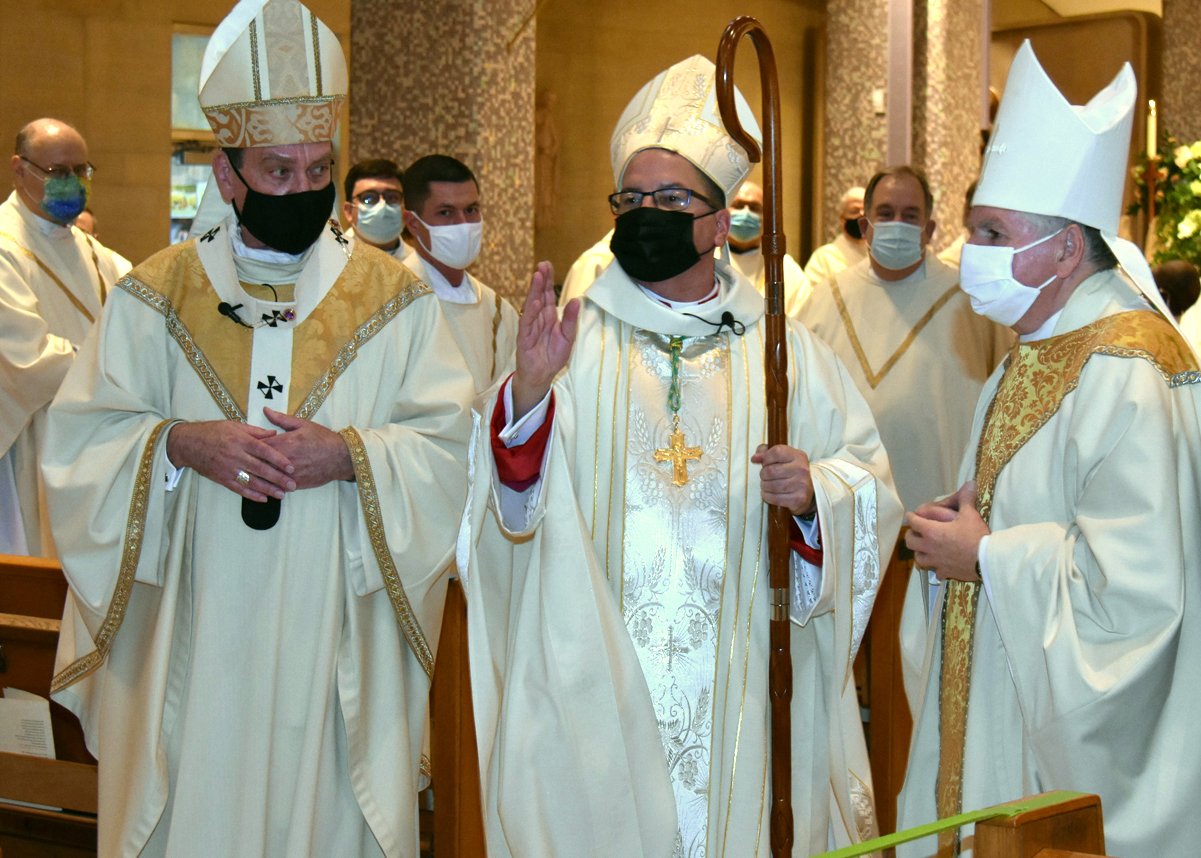YOUNGSTOWN, Ohio (CNS) — For a society, a world, struggling through “a time of pervasive darkness,” Youngstown Bishop David J. Bonnar asked: “What are we to do in the midst of this long night?”
In his pastoral letter to diocesan Catholics, titled “Testify to the Light,” he also asks: “How do we help one another to come out of the darkness?”
The answer, he said, is for the entire Catholic Church to “do as John the Baptist did, to ‘point to the light in Jesus.'”
In his introductory note to the Feb. 19 pastoral letter, Bishop Bonnar, who was ordained and installed to head the diocese Jan. 12, describes the present as a dark and trying time, marked by the death of his predecessor, Bishop George V. Murry; the political polarization afflicting our body politic; the clergy abuse scandal; and the continuing COVID-19 pandemic.
“One of the questions I have been personally addressing since my appointment as the sixth bishop of Youngstown is: How can I, as shepherd, lead the flock of this diocese from the darkness of this unprecedented time into the light?” he said.
Bishop Bonnar held up the example of John the Baptist, citing the opening chapter of the Gospel of John. It describes John the Baptist as a man “sent from God” to “testify to the light, so that all might believe through him.”
“We know the darkness of evil on many levels and in various parts of the world that causes great destruction and wreaks havoc in many lives,” the bishop said, citing abortion, euthanasia, racial injustice, poverty, political polarization, addiction, personal loss and upheaval.
“Our church is not exempt from evil,” Bishop Bonnar noted in the letter. “We know the painful darkness of hurt and betrayal that engenders mistrust.
“With anger and deep sadness we continue, as a church, to walk through the darkness of clergy sexual abuse, praying for the healing of all victims and taking every measure possible to ensure that this scourge never happens again,” he said.
“More recently, we all have been living in the deep darkness of the pandemic,” he said. “Has there ever been such an extended time of darkness” afflicting so many people?
The bishop noted the importance of Catholic sacramental tradition and family in confronting and moving out of the darkness.
As they move out of the darkness into the light, Bishop Bonnar challenged diocesan Catholics to join him in embracing five priorities for this collective effort to testify to the light — prayer, healing, communication, service and joyful witness.
“Prayer gives meaning to lives and all that that we are,” Bishop Bonnar wrote.
He cited Pope Francis’ 2013 apostolic exhortation, “The Joy of the Gospel,” in which the pope wrote that “Without prolonged moments of adoration, of prayerful encounter with the word, of sincere conservation with our Lord, our work easily becomes meaningless.”
Bishop Bonnar encouraged Catholics to focus on listening in prayer, removing distractions, slowing down and engaging in the discipline of silence. Also, “looking ahead to the return of meetings and gatherings,” he encouraged everyone, himself included, “to listen more to each other through the sharing of our faith.”
He suggested that “when possible,” meetings begin “with prayer centered in faith sharing.”
“This is precisely how faith grows. In groups, people prayed and shared their experience of Jesus Christ. They listened attentively and supported one another and as a result their faith flourished,” Bishop Bonnar continued.
“The more comfortable we are sharing our faith, the more at ease we will become in preaching the good news in our secular world,” he noted.
He called for renewed emphasis on the parish as “a key place where we live and grow in faith,” for the fostering of small faith-sharing parish groups for people to “support one another as they become disciples” and deeply experience Jesus.
He added, “We need more disciples in the church who like John the Baptist can boldly speak in the wilderness and be a witness to the light.”
This renewed sense of prayer, Bishop Bonnar wrote, can empower parishes toward evangelization as missionary discipleship and “give special attention to those who have become lukewarm or have left the faith.”

To foster the second priority — healing — Bishop Bonnar noted that “our world and church are hurting. There are many wounded among us.”
“Let me say that if anyone has been hurt by the church in any way, I beg your forgiveness. One of the revelations we have to be reminded of is that the church, although a divine institution, is also human made up of human beings who are broken,” the bishop stressed.
“Where there is humanness, there is goodness and possibility as well as weakness, sin and evil. However, where there is Jesus, there is always forgiveness.”
To promote healing, Bishop Bonnar advised prayer, patience, active efforts toward reconciliation, and when necessary, counseling.
Regarding communication, he said at a time when “sadly” for some “the church has become irrelevant,” the church must strive to be a positive voice in the world at the diocesan, parish and school levels.
“We need to communicate clearly and boldly,” ensuring that the church is transparent and “to take advantage of every media source at our disposal and use it for the good of the church” — whether newsprint, email, website, television and social media.
On the fourth priority — service — Bishop Bonnar asked diocesan Catholics to partner with him on serving. In Catholic tradition, he noted, ‘”Bishop’ is a title of service, not of honor.”
“As bishop, I need to be a servant leader who seeks to lead a servant church. We cannot be a church that exists solely for ourselves. We need to be a servant church that reaches out to the poor, homeless, imprisoned, sick, lonely and forgotten.”
He also asked parishes in each deanery “to conduct a needs assessment of their respective territory with the hope of continuing to reach out to those in most need” and network with each other and other deaneries and Catholic Charities to serve the most vulnerable.
“Our parishes cannot afford to become complacent or self-serving,” Bishop Bonnar wrote.
In addition, “we need to also work hard to become a unified voice against injustice,” speaking against “the sin of racism” and challenging “one another to see Christ in every human being and to behold the dignity of every human person from the womb to the tomb,” as well as examining and seeking to reform social systems that perpetuate racial injustice.
He also called on Catholics to work with him on being “a joyful witness,” the fifth priority.
“In this time of darkness, we need to testify to the light of Jesus Christ,” Bishop Bonnar said. “We cannot allow the darkness to overwhelm us, for we are people of hope who believe in Jesus Christ, the light of the world.”







